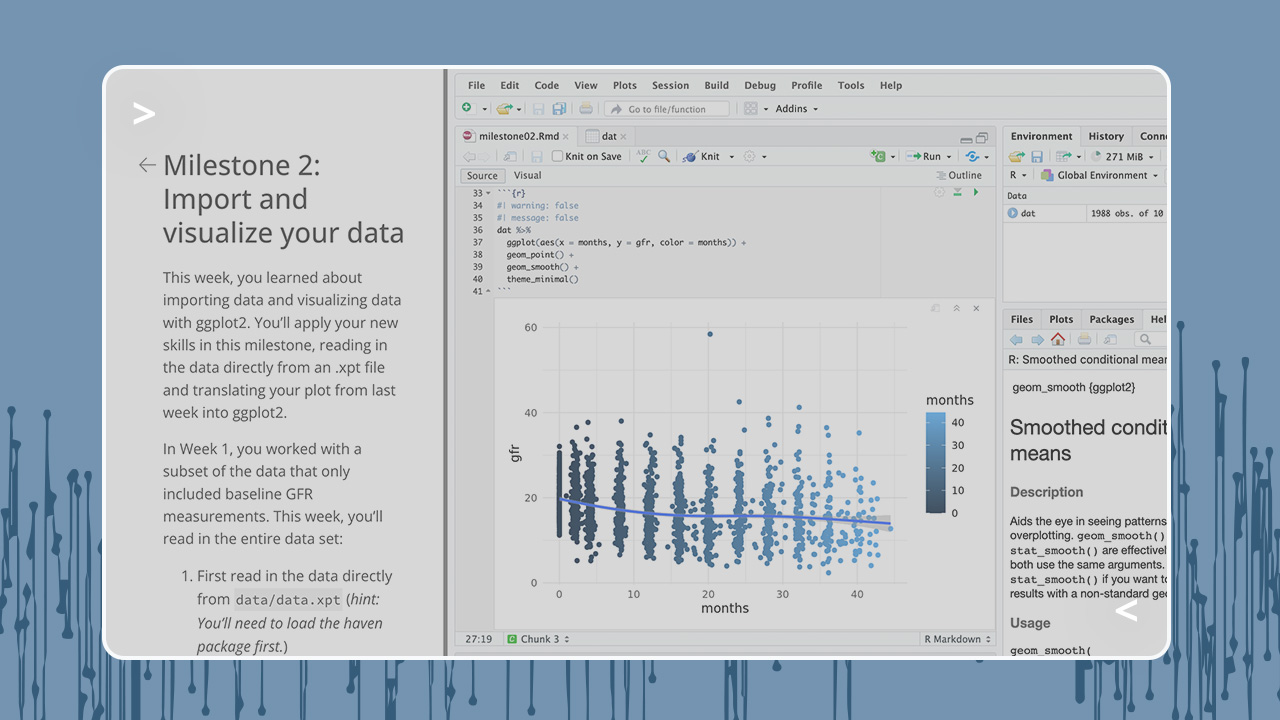Training teams to adopt open-source programming languages with Posit Academy

From translational research to publicly available regulatory submissions to the FDA, the world of pharmaceuticals is undergoing a major transformation as open-source data science takes center stage. The shift to open source requires many statistical programmers to move away from their legacy software and become proficient in programming languages like R and Python.
However, it can be challenging to adopt new tools. Across meetups and webinars, data science leaders from pharma companies often ask us how teams train the next generation of open-source data professionals. Answering this question is critical for organizations to leverage the benefits of open source to their fullest potential.
A few weeks ago, Garrett Grolemund, Director of Learning at Posit, presented our solution to this challenge, Posit Academy. Academy is a mentor-led apprenticeship that teaches programmers in the pharmaceutical space how to use open-source tools within the context of clinical data. With Academy, programmers learn open-source programming languages through a turnkey curriculum. More importantly, Academy provides the skills and practice needed for programmers to apply what they’ve learned to their work – during and after the program.
Begin with a dataset close to the job
A key question when learning a new programming language is: where will you find your data? An online tutorial may walk through an analysis for their readers. However, they often use simple or generic datasets. The data does not need data preparation, or the results have obvious takeaways – both rare finds in the workplace. The tutorial’s attempt to reach a broad audience means students cannot extend the lesson to real-world practice.
When setting up a session, the Academy team works with your team to create a project with a relevant and applicable dataset. We set up Academy’s MDRD project for pharmaceutical companies. It is an apprenticeship that mentors students through the essential data analysis steps of the MDRD dataset, which investigates the Modification of Diet in Renal Disease (MDRD) study from the National Institute of Diabetes and Digestive and Kidney Diseases (NIDDK).
The Modification of Diet in Renal Disease (MDRD) study consisted of two randomized clinical trials that investigated whether protein restriction and control of blood pressure had an effect on the progression of chronic kidney disease (CKD). The study tested two hypotheses—that (1) a reduction in dietary protein and phosphorous intake and (2) the maintenance of blood pressure at a level below that usually recommended safely and effectively delays the progression of CKD.
We guide students from “import to report” (program in R or Python, import, clean, transform, visualize, model, work with strings, dates, and factors, make tables and figures, report, and document your work in a reproducible and transparent fashion). And we can even swap out the MDRD data set with one of your own.
The team learns the skills to not just work with the MDRD dataset but also how to use open-source tools to create visualizations, tables, and reproducible reports for other datasets.
Focus on developing skills for the future
Academy focuses on developing skills that learners retain after the apprenticeship is over. Whereas other trainings may concentrate on functions and other facts that help students understand programming at the conceptual level, we focus on having students actually program—a lot—under the guidance of a mentor.
Repetition and practice make a concept easier to remember. This is especially true when we encounter the concept in a meaningful context, such as a real-world problem, as we described above. A practice-based approach can help you to build a deeper understanding of the material and make it more likely to result in long-term retention.
Ask the questions that life scientists ask
When you work on industry-specific problems, you gain practical experience and learn to solve real-world problems you may encounter in your future job. This experience can help you to develop a better understanding of the programming language and its applications.
Rather than focusing on theoretical concepts, we work on actual problems to learn the language in a more hands-on manner. This process can help you to understand the language more deeply and develop better coding skills.
Learn with others
No one learns in isolation. We provide social motivation that gets learners to do the practice, which, let’s face it, is hard work.
Learners receive frequent feedback from their mentors. Mentors could come from Posit but could also be a coach at your organization that serves as a resource for students. That means that once the session ends, the mentor is still at the company and available to continue coaching others.
With Posit Academy, a cohort-based data science apprenticeship, each learner is placed in a group of 5-7 other students working on the same practice-based project. Together, you problem-solve, discuss lessons, stay motivated, and hold each other accountable. Since everybody is working on the same project, the team grows their programming skills together. You can ask each other to clarify or expand on a solution and then apply it to your own work. You ask and answer industry-specific questions, building knowledge together.

Thanks to this approach, your team becomes another source of knowledge and motivation.
Find out more about Posit Academy
Posit Academy has taught 600 students (and counting) with a 95% course completion rate how to use R or Python within the context of their industry and organization. Your team gets quick and frequent payoffs with each lesson, milestone, and meeting that last after the program is over.
- Watch the recording of the Posit Academy Overview with Garrett Grolemund, Director of Learning at Posit.
- Learn more on the Academy webpage.
- Schedule a call with a Posit expert or contact your customer service representative.
